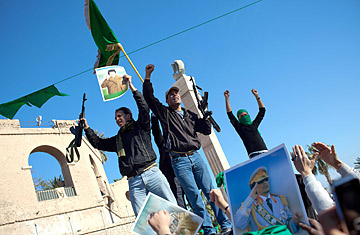
Pro-Gaddafi soldiers and supporters gather to celebrate in Green Square.
The plane doors swung open at Tripoli Airport late on Saturday night to reveal our welcome to the embattled Libyan capital: One rakishly thin man standing atop the stairway greeting passengers, waving a green flag and chanting, "Down with U.S.A.! Down with Obama!"
The last time I flew into Tripoli airport in early 2010, I arrived on a packed flight direct from Paris, squeezed among dozens of American and European representatives from companies that were vying for contracts to build new luxury seaside hotels, airports, and roads. The rest of the world was still in deep economic recession. But the Libyan government had billions of dollars in oil revenues to spend, and decades of stagnation to overcome. Arriving in Muammar Gaddafi's stronghold after a year's absence, I was astonished to see how fast the regime had sunk into a state of deep isolation.
There are now no flights into Libya from Europe. Instead I flew in on Tunisia's airline, one of the few which still dares to land in Tripoli. And Libya's economy is now paralyzed by cataclysmic violence and a burgeoning rebel movement, which has tipped the huge oil-rich country into a civil war that will either end Gaddafi's 42-year rule or cleave Libya into warring halves. Alongside Tripoli's near-deserted runway on Saturday, about 10 cranes stood idle over the half-built new airport building. I had been told last year that the new edifice would soon be a thriving hub for travelers criss-crossing Africa and the Middle East.
These days, Tripoli is a hub for thousands of African migrants who have set up sleeping areas on the sidewalks leading to the departure areas of the airport, desperate to escape the spiraling conflict. It has become a makeshift refugee camp, the streets outside the airport building a sea of migrants. Late on Saturday night, loud shouting rose in the airport terminal as word spread that a flight was leaving soon for Mauritania. Hundreds of people from that northwest African country began pushing towards a departure gate; the airport staff wore face masks apparently to protect themselves, they said, from odors of the crowd, many of whom have not been able to bathe for several days. "It is too dangerous here," one Mauritanian man said as I passed by. "It is better in Mauritania" — a desperately poor country that has fought its own civil war for years.
Despite the sense in Tripoli — a city of more than one million — of a government which has been shunned by the world, Gaddafi shows no haste in leaving power, like two neighboring presidents, those of Tunisia and Egypt. Rather, the Brotherly Leader, as Gaddafi is known at home, is bracing for a protracted war. After lightning victories over the past two weeks by rebel forces in eastern Libya, and rebel victories in the western towns of Zawiyah and Misurata, near Tripoli, government forces launched a massive counter-assault over the weekend, inflicting heavy casualties on the burgeoning anti-government movement. Government fighters on Sunday ambushed a column of rebels near the oil town of Ras Lanuf, as they were attempting to inch their way westwards towards Gaddafi's home town of Sert. And 27 miles west of Tripoli, in the crucial oil port of Zawiyah, a town of about 200,000 people, doctors and eye witnesses told reporters that they had been under heavy shelling for two days, with dozens of people killed. The accounts cannot be verified, since the government has banned foreign journalists from traveling to Zawiyah; journalists who attempted to enter the war-torn city unofficially on Saturday were detained by military police for several hours and then escorted back to Tripoli. Deputy Foreign Minister Khaled Qaid told reporters on Saturday evening that Zawiyah was "quiet and peaceful," and "99 percent" under government control.
Back on the offensive, the state-run television told Libyans Saturday night that the rebels had been defeated and that, in effect, the war was over. Tripoli resounded all night with heavy gunfire, which government officials insisted was purely celebratory.
Despite the ongoing fighting, and the grim news of regime stalemates emerging from foreign media, hundreds of Tripoli residents poured into Green Square on Sunday morning for a victory party, apparently having swallowed the government message about the conflict whole. Wrapped in scarves, hats, and even face paint in the green of Gaddafi's revolution, they chanted and danced for hours. Officials distributed thousands of green and white baseball caps imprinted with Gaddafi's photograph, which appeared to have been manufactured overnight.
Outside my hotel a crowd of Gaddafi supporters blocked the street at 8 a.m., shouting "Libya forever!" while car horns honked for nearly an hour. Others residents rode atop car roofs, waving green flags and screaming their support for Gaddafi. "We are thrilled," said Maissam Khaled, 28, a civil engineer, who was among the crowds in Green Square on Sunday morning. "All the areas of Libya are in the hands of the people," he said, referring to Gaddafi's supporters. "There is the green color now in Benghazi, Tobruk — all of Libya."Benghazi and Tobruk, by all other accounts, remain firmly in the hands of Gaddafi's enemies.
